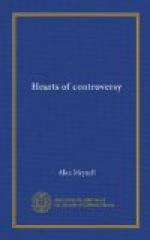I have to cite this instance of a change of mind, or of terms and titles, in Swinburne’s estimate of art and letters, because it is all-important to my argument. It is a change he makes in published print, and, therefore, no private matter. And I cite it, not as a sign of moral fault, with which I have no business, but as a sign of a most significant literary insensibility—insensibility, whether to the quality of a poetaster when he wrote “poet,” or to that of a poet when he wrote “poetaster,” is of no matter.
Rather than justify the things I have ventured to affirm as to Swinburne’s little intellect, and paltry degree of sincerity, and rachitic passion, and tumid fancy—judgement-confounding things to predicate of a poet—I turn to the happier task of praise. A vivid writer of English was he, and would have been one of the recurring renewers of our often-renewed and incomparable language, had his words not become habitual to himself, so that they quickly lost the light, the breeze, the breath; one whose fondness for beauty deserved the serious name of love; one whom beauty at times favoured and filled so visibly, by such obvious visits and possessions, favours so manifest, that inevitably we forget we are speaking fictions and allegories, and imagine her a visiting power exterior to her poet; a man, moreover, of a less, not more, than manly receptiveness and appreciation, so that he was entirely and easily possessed by admirations. Less than manly we must call his extraordinary recklessness of appreciation; it is, as it were, ideally feminine; it is possible, however, that no woman has yet been capable of so entire an emotional impulse and impetus; more than manly it might have been but for the lack of a responsible intellect in that impulse; had it possessed such an intellectual sanction, Swinburne’s admiration of Victor Hugo, Mazzini, Dickens, Baudelaire, and Theophile Gautier might have added one to the great generosities of the world.
We are inclined to complain of such an objection to Swinburne’s poetry as was prevalent at his earlier appearance and may be found in criticisms of the time, before the later fashion of praise set in—the obvious objection that it was as indigent in thought as affluent in words; for, though a truth, it is an inadequate truth. It might be affirmed of many a verse-writer of not unusual talent and insignificance, whose affluence of words was inselective and merely abundant, and whose poverty of thought was something less than a national disaster. Swinburne’s failure of intellect was, in the fullest and most serious sense, a national disaster, and his instinct for words was a national surprise. It is in their beauty that Swinburne’s art finds its absolution from the obligations of meaning, according to the vulgar judgement; and we can hardly wonder.




